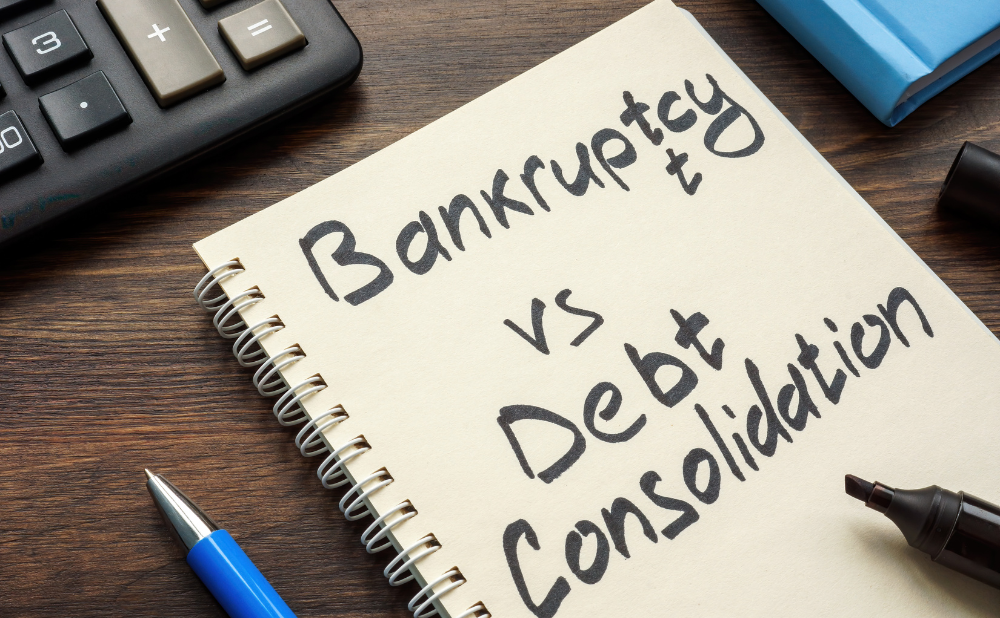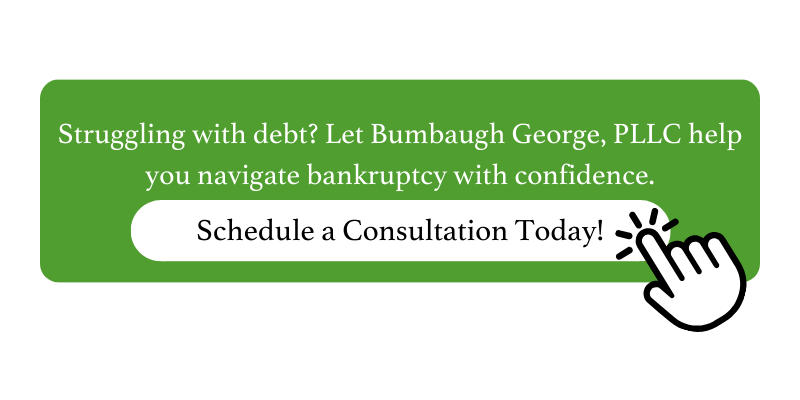Debt consolidation vs bankruptcy – it’s a decision no one wants to face, yet many people with bad credit find themselves struggling with mounting credit card balances and debt management plans. In Pennsylvania, understanding your options for debt relief is essential. While the thought of lawyers and courtrooms can be scary, sometimes having a legal expert on personal loans and credit advice by your side can be helpful during stressful times.
Debt consolidation vs bankruptcy— each offers distinct paths to get your finances back on track. This article analyzes each approach in the context of Pennsylvania, explaining how they function and when an attorney’s expertise is beneficial.
Debt Consolidation: Simplifying Your Debt in PA
Debt consolidation combines multiple debts into a single new loan. This is usually done with a lower interest rate than the combined rates of your existing debts. This can simplify your finances and potentially save money over time.
How Debt Consolidation Works in Pennsylvania
Several methods for debt consolidation are available to Pennsylvania residents:
- Debt Consolidation Loans: Financial institutions in PA offer these loans. They are specifically designed to pay off existing debts, leaving you with a single monthly payment.
- Balance Transfer Credit Cards: If you qualify for a credit card with a 0% introductory APR period, transferring your existing balances can give you breathing room. This will allow you to focus on repayment.
- Home Equity Loans: These loans use your home as collateral. They can offer a lower interest rate, but be cautious. Missing payments could put your home at risk.
- 401(k) Loans: Borrowing against your retirement savings is generally not advised. This may be a last resort for some. These loans typically have a maximum borrowing limit of $10,000 or 50% of your vested balance, whichever is greater. However, they come with drawbacks, including potentially high fees and penalties if not repaid.
The Role of an Attorney in Debt Consolidation
While an attorney is not always necessary for debt consolidation, they can be invaluable in specific situations, such as:
- Negotiating With Creditors: An attorney experienced in debt relief can communicate with your creditors. They may be able to get your interest rates or monthly payments lowered.
- Reviewing Loan Documents: Before signing any consolidation loan agreement, it’s crucial to fully comprehend the terms. An attorney can clarify complex legal jargon, ensuring the agreement aligns with your best interest.
Bankruptcy: A Fresh Start in Pennsylvania
While often considered a last resort, filing for bankruptcy can provide relief from overwhelming debt. This is especially helpful when you are unable to manage what you owe.
Types of Bankruptcy for Individuals in Pennsylvania
There are two primary types of bankruptcy for individuals in PA:
- Chapter 7 (Liquidation Bankruptcy): This process involves selling certain assets to pay off creditors, with some exemptions allowed under Pennsylvania law. Following asset liquidation, remaining eligible debts are discharged.
- Chapter 13 (Reorganization Bankruptcy): If your income is above a certain threshold or you want to protect certain assets, Chapter 13 might be a better option. It allows you to create a manageable repayment plan to repay some or all of your debt over a 3-5 year period. Chapter 13 bankruptcy aims to offer a route towards financial stability without the more drastic measures of Chapter 7.
How an Attorney Can Help
Filing for bankruptcy is complex and requires a thorough understanding of relevant laws and procedures. An experienced bankruptcy attorney can guide you through each step:
- Determining Eligibility: Not everyone qualifies for all types of bankruptcy. A Pennsylvania attorney can assess your financial circumstances, income, expenses, and assets to help you determine if you are eligible for bankruptcy. If you are eligible, they can help you decide which chapter best suits you.
- Filing Your Petition Correctly: Errors in your bankruptcy petition can have serious consequences. Attorneys experienced with these forms and processes reduce the risk of costly mistakes.
- Representing Your Interests: An attorney advocates on your behalf during meetings with creditors, ensuring you receive fair treatment.
Debt Consolidation vs Bankruptcy: Factors to Consider
Choosing between debt consolidation vs bankruptcy requires careful evaluation of your specific situation.
Amount of Debt
Debt consolidation is often a better solution for those with a manageable level of debt. This is best for those who can repay within a few years with a restructured plan. Consider what options make the most sense based on your individual circumstances.
Credit Score and Future Borrowing
Debt consolidation can potentially improve your credit score by demonstrating responsible debt management. However, bankruptcy requires a significant drop in credit score. Chapter 7 can stay on your credit report for a decade. Chapter 13 can stay on your credit report for seven years. This doesn’t mean borrowing is impossible after bankruptcy. You will find that securing favorable interest rates will take more time and strategy.
Assets
Chapter 7 bankruptcy might require selling assets to pay creditors. If preserving specific belongings is non-negotiable, consider Chapter 13 or explore debt consolidation options. You want to explore options that won’t put valued assets at risk.
Case Study: The Smiths Regain Financial Footing
Imagine a family in Greensburg dealing with financial challenges after an unexpected medical emergency. Facing growing medical bills alongside significant credit card debt, they start missing payments. Their once-solid financial ground begins to crumble as they struggle to make the minimum payments on their credit cards. Feeling overwhelmed and unsure of where to turn, they schedule a consultation with a local bankruptcy attorney.
After a comprehensive review of their situation — analyzing their income, expenses, debts, and assets — the attorney recommends Chapter 13 bankruptcy as a path forward. Recognizing the desire to keep their modest home while still tackling their debt, a structured Chapter 13 repayment plan, tailored to their monthly budget, is created. This case exemplifies how legal counsel tailored to Pennsylvanian circumstances provides solutions aligned with both financial reality and personal goals.
Debt Consolidation vs Bankruptcy: Which is Right for Me?
When deciding if debt consolidation vs bankruptcy is right for you, there are a few things to keep in mind. Consider your financial goals and your risk tolerance. It’s also important to factor in how much debt you have. Debt consolidation may be a good option if you can repay your debt in three to five years.
If you’re struggling to make minimum payments, bankruptcy may be the best option. Bankruptcy can stay on your credit report for seven to ten years, but it will allow you to get a fresh financial start.
Talking to a financial advisor or legal counsel may be helpful to discuss your options.
Conclusion
Choosing between debt consolidation vs bankruptcy requires thorough evaluation of individual financial circumstances, goals, and risk appetite. This is where an experienced Pennsylvania attorney specializing in bankruptcy or debt relief becomes an essential guide. Whether the goal is streamlining finances through a debt consolidation plan, exploring a Chapter 13 restructuring, or finding potential debt relief via Chapter 7, having expert counsel throughout ensures legal protection while you work towards regaining solid financial footing. Remember, debt, no matter how overwhelming, isn’t a life sentence. With the right approach and guidance, you can reclaim your financial well-being.
FAQs about Debt Consolidation vs Bankruptcy
What are the Drawbacks of a Debt Consolidation Loan?
While potentially useful, debt consolidation loans come with important considerations. One major drawback: while monthly payments may become lower, the overall interest paid over the loan’s life might be higher due to a potentially extended repayment period.
How Long Does Debt Consolidation Stay On Your Record?
Debt consolidation doesn’t appear as a separate entry on your credit report. The impact on your credit score from this process typically lasts a year; it disappears entirely from your report after two years. Positive repayment history post-consolidation improves your overall credit score.
Is it Better to Consolidate or File for Bankruptcy?
The choice between debt consolidation and filing for bankruptcy depends on your financial situation. Debt consolidation is preferable if you have a steady income and seek to reduce interest rates on debts, thereby managing payments without damaging credit scores significantly. Conversely, bankruptcy might be suitable when debts are overwhelming and beyond repayment through consolidation, offering legal relief but impacting credit more severely.
What is the Difference Between Consolidated and Bankruptcy?
Consolidation involves combining multiple debts into a single, manageable loan with potentially lower interest rates. It simplifies payments but does not eliminate debt. Bankruptcy, however, is a legal process where individuals or businesses unable to meet financial obligations seek relief from some or all of their debts. This can drastically affect credit scores and public records but provides a fresh start financially by discharging debts.









